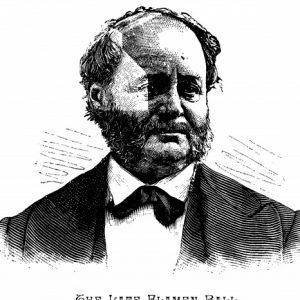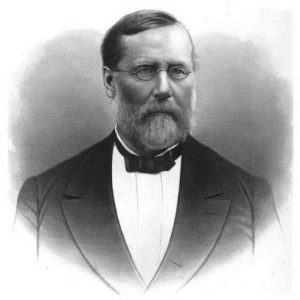calsfoundation@cals.org
Seizure of Arkansas Cannon
aka: United States v. Six Boxes of Arms
This court case involved the seizure of a cannon in the North intended for a state in the South on the cusp of secession and, thereby, epitomized the political and military tensions that characterized the final months of sectional breakdown prior to the Civil War. The decision rendered in this case also established an important legal precedent in relation to lawful seizure of property and the retention of legal ownership with war on the horizon.
On February 15, 1861, William J. Syms and Samuel R. Syms of the New York City munitions supply firm of W. J. Syms and Brother contracted with the State of Arkansas for an order of munitions to be delivered in two parts in early April. On April 3, the first part shipped out of the port of New York en route to Baltimore, Maryland, and then westward on the Baltimore and Ohio Railroad. Once the shipments arrived at Cincinnati, Ohio, they were transferred to steamboats for transport downriver to Arkansas. The second shipment went by the same route on April 9, 1861, with both shipments directed to George P. Williams as the firm’s agent in Little Rock (Pulaski County).
On April 17, less than one week after the bombardment and surrender of Fort Sumter and the onset of the Civil War, a pro-Union mob descended on the steamers Glendale and Ohio No. 3 at the Public Landing in Cincinnati and seized six boxes containing a brass cannon, artillery carriage-wheels, cartridges, and other miscellaneous military items. Cincinnati’s chief of police retained ownership of the items until Alexander C. Sands, the U.S. marshal in Cincinnati, took possession of them on May 23. Soon thereafter, the U.S. District Attorney for the Southern District of Ohio declared the shipments to be in violation of President Abraham Lincoln’s proclamations of blockade against the ports of seceded states and, therefore, contraband of war subject to confiscation and forfeiture. The firm of W. J. Syms and Brother soon filed as claimants in an attempt to regain legal possession of the property.
Judge Humphrey Howe Leavitt presided over the case of United States v. Six Boxes of Arms when it came before the United States Court for the Southern District of Ohio during the June term of 1861, by which time Arkansas had seceded from the Union. Flamen Ball, U.S. Attorney for the Southern District of Ohio, handled the government’s case. In addition to violation of the president’s proclamation of blockade, District Attorney Ball also based part of the government’s argument on the precedent known as the Law of Nations, arguing that a state of war existed between the United States and Arkansas, which thereby severed commerce between the belligerents and classified such property as contraband of war.
The Cincinnati firm of Timothy D. Lincoln, James Warnock, and Samuel W. Smith argued the case for the claimants. They based their argument on several points. In addition to the Syms brothers’ status as citizens of a loyal state, the claimants argued that no order of blockade existed on the date they made their contract with the State of Arkansas; furthermore, on the dates of shipment and seizure, Arkansas had not seceded and, therefore, was not subject to the blockade once it came into effect. On a related note, the claimants argued that many observers believed secession would ultimately fail in Arkansas due to a still sizeable pro-Union sentiment in several areas of the state. (The state’s initial convention did in fact reject secession.) These sentiments did not demonstrate a noticeable public shift until approximately April 25, largely in reaction to President Lincoln’s call for state troop quotas to suppress rebellion among the seceded states, and even so the convention did not pass an ordinance of secession until May 6.
George P. Williams proved to be the key participant and witness for the claimants. In his testimony, Williams confirmed the prevailing assessments relative to secessionist and Unionist sentiments in Arkansas through most of April. Once sentiments shifted noticeably in favor of secession after Lincoln’s call for troops, Williams journeyed to Cincinnati on April 25 to take charge of the shipments and arrange for their return to the Syms firm in New York City. Once returned to New York, the Syms brothers planned to offer the items for sale to the city’s Union Defense Committee.
Judge Leavitt based his decision on the date of secession by Arkansas, as well as the difficulty of accurately assessing the level of disloyal sentiment in the state before and after the shipment left New York. Leavitt also gave significant consideration to the shipment’s intended destination after a perceptible shift in favor of secession in Arkansas. The Law of Nations as applied to the suspension of trade between distinct and independent belligerents, Leavitt stated, did not apply so clearly to the states of the Confederacy because the federal government did not recognize the Confederacy as a sovereign nation or the act of secession as legal. Leavitt also stated that, due to the divided sentiments within Arkansas, all citizens of the state could not be assumed to be disloyal or enemies of the nation. He compared the situation of Unionists in Arkansas with western Virginia and eastern Tennessee, where similar populations received the sympathy and protection of the federal government. A crucial difference in this comparison, but which nonetheless served the claimant’s argument, is that Arkansas had not seceded at the time of shipment or seizure. Furthermore, the state seemed sufficiently divided on the question of secession as to not warrant an assumption about the general disloyalties of the state’s population. Indeed, Lincoln’s requisition for state troops and declaration of blockade included Arkansas as a loyal state.
Williams’s actions after April 25 also proved crucial to Leavitt’s assessment of the case, as it established compliance with circulars sent out by Salmon P. Chase as secretary of the treasury. According to these circulars, once he was satisfied that potential contraband was not intended for unlawful or disloyal use, Chase instructed officials to restore such property to its legal owner. Williams’s efforts to intercept the shipments at Cincinnati and effect their return to New York due to concerns about the increased potential for secession showed that there was no intent to continue the shipment to Arkansas; with the shipment redirected to New York and defense of the Union, it could not be classified as contraband even after the U.S. marshal assumed custody on May 23 (more than two weeks after Arkansas voted for secession).
Leavitt took pains to note that he found no fault with the city’s customs officer for not restoring ownership after investigating the intent to return the materials to New York, as per Secretary Chase’s decree. Leavitt stated that the court would most likely have granted a request for seizure based on probable cause. The government retained the right to legally seize property, Leavitt emphasized, but that right did not automatically result in permanent loss of the citizen’s right to retain ownership. The question of legal right to property, especially under looming threat of war, needed to be determined in a court of law such as occurred in this case.
Judge Leavitt decided in favor of the claimant and ordered the restoration of their property. There is no record of whether the State of Arkansas sought or received a refund for the undelivered shipments.
For additional information:
Carroll, G. Danielson. Carroll’s New York City Directory. New York: Carroll and Company, Publishers, 1859.
Cincinnati Daily Enquirer, July 13, 1861.
Greve, Charles Theodore. Centennial History of Cincinnati and Representative Citizens. Vol. 2. Chicago: Biographical Publishing Company, 1904.
Reports of Cases Decided in the Circuit and District Courts of the United States Within the Southern District of Ohio, Humphrey H. Leavitt, Judge. Vol. 1. Cincinnati: R. Clarke and Company, 1872.
Robert Patrick Bender
Eastern New Mexico University–Roswell



 Flamen Ball
Flamen Ball  Timothy Lincoln
Timothy Lincoln 



Comments
No comments on this entry yet.